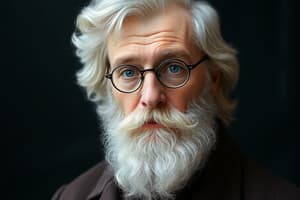Podcast
Questions and Answers
What does Berkeley mean by 'Esse est percipi'?
What does Berkeley mean by 'Esse est percipi'?
- Understanding requires material evidence.
- Perception is independent of belief.
- To exist is to be perceived. (correct)
- To be is to understand.
Which of the following best represents Berkeley's view on physical objects?
Which of the following best represents Berkeley's view on physical objects?
- Their existence is not dependent on a perceiver.
- They are mere collections of sensations and ideas. (correct)
- They can be defined by their material components.
- They exist independently of perception.
In Berkeley's philosophy, what are primary qualities?
In Berkeley's philosophy, what are primary qualities?
- Characteristics that exist in the object. (correct)
- All qualities that cannot be perceived.
- Perceptions that can change over time.
- Qualities that depend on the observer's experience.
What role does Berkeley attribute to God concerning reality?
What role does Berkeley attribute to God concerning reality?
Which statement aligns with Berkeley's perception theory?
Which statement aligns with Berkeley's perception theory?
Which statement accurately reflects the critique of materialism presented by Berkeley?
Which statement accurately reflects the critique of materialism presented by Berkeley?
What is a key difference between subjective and objective idealism?
What is a key difference between subjective and objective idealism?
How does Berkeley's idealism challenge traditional views of existence?
How does Berkeley's idealism challenge traditional views of existence?
What is the fundamental assertion of immaterialism?
What is the fundamental assertion of immaterialism?
Which philosopher's thoughts were significantly influenced by Berkeley's ideals?
Which philosopher's thoughts were significantly influenced by Berkeley's ideals?
Flashcards are hidden until you start studying
Study Notes
Idealism
- George Berkeley is a central figure in idealism, a philosophical theory asserting that reality is fundamentally mental or immaterial.
- Key Argument: "Esse est percipi" (To be is to be perceived) – argues that objects only exist when they are perceived.
- Rejects materialism, claiming that physical objects cannot exist independently of perception.
- Objects are collections of sensations and ideas; their existence depends on being perceived by minds.
- Berkeley posits that God perceives everything, thus providing a constant reality even when individual minds are not observing.
Perception Theory
- Perception is the foundation of Berkeley’s philosophy; it emphasizes the role of sensory experiences in the understanding of objects.
- Distinction between primary and secondary qualities:
- Primary qualities: characteristics that exist in the object (e.g., shape, size).
- Secondary qualities: aspects that depend on the perceiver (e.g., color, taste).
- Berkeley contends that all qualities are dependent on perception and there are no qualities that exist independent of a mind.
- Emphasizes that our knowledge of the external world is mediated through our perceptions, which are subject to our mental states.
- The theory challenges the notion of a material world existing independently from perception, promoting a view that reality is constructed from ideas and experiences.
Idealism
- George Berkeley is a key figure in idealism, a philosophical theory that says reality is mental or immaterial.
- Berkeley's main argument is "Esse est percipi," which means "To be is to be perceived."
- His theory rejects the idea that physical objects can exist without being perceived.
- Instead, he believes that objects are just collections of sensations and ideas, which means they only exist when perceived by a mind.
- He argues that God perceives everything, which ensures that things exist even when no human mind is observing them.
Perception Theory
- Perception is the foundation of Berkeley's philosophy.
- He makes a distinction between primary and secondary qualities:
- Primary qualities: These are characteristics of an object like shape and size.
- Secondary qualities: These are aspects of objects like color and taste which depend on the perceiver.
- He claims that all qualities are dependent on perception, meaning they don't exist outside of a mind's perception.
- Berkeley emphasizes that our knowledge of the world is based on how we perceive it, and perception is influenced by our mental states.
- This theory challenges the idea that there's a material world that exists independently from our minds, proposing instead that reality is made up of ideas and experiences.
Immaterialism
- Reality is composed solely of minds and their ideas.
- Objects only exist when they are perceived.
- “Esse est percipi” (To be is to be perceived) is a fundamental principle of immaterialism.
- Materialism is critiqued for its reliance on a concept of material substance that cannot be directly observed.
- God's constant perception ensures the continuous existence of objects, even when not perceived by humans.
Idealism
- Reality is fundamentally mental, immaterial, or spiritual.
- Subjective idealism posits that reality is dependent on individual perception.
- Objective idealism asserts that ideas exist independently but are contingent on a higher mind, often God, in Berkeley's framework.
- Physicalism, the view that everything is physical, is rejected by idealism.
- The mind plays a crucial role in shaping and constituting reality.
Influence of Berkeley's Idealism
- Berkeley's idealism paved the way for later philosophers like Kant and Hegel.
- Influenced debates in epistemology (study of knowledge) and metaphysics (study of reality).
- Berkeley's metaphysics introduced a world driven by mental perceptions, challenging conventional views of existence and impacting modern philosophical discourse on reality and perception.
Studying That Suits You
Use AI to generate personalized quizzes and flashcards to suit your learning preferences.




